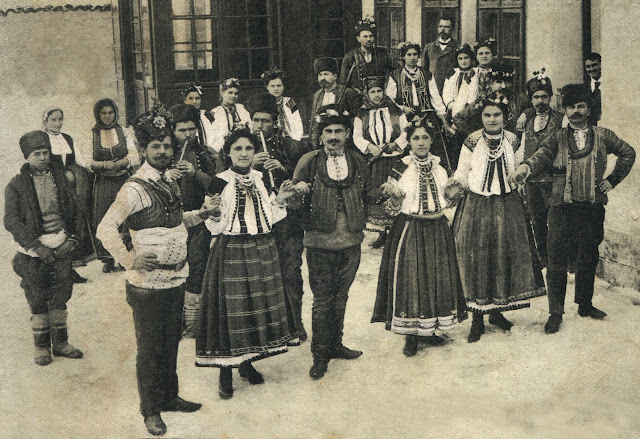INDIA – INDE
Amir Khan – Khayal by Ustad Amir Khan – His Master's Voice – EASD 1331, released in 1968 (LP)
%20-18%2032.jpg)
The unrivalled and highly influential 20th century Hindustani classical Khyal vocalist Amir Khan (1912-1974), was born in Kalanaur, Punjab State. After first studying the bowed sarangi under the tutelage of his father Shahmir Khan, Amir embraced singing, and later founded the Indore Gharana school based on the styles of three towering vocalists, namely Abdul Wahid Khan (1871–1949), Rajab Ali Khan (1874–1959) and Aman Ali Khan (1888–1953).
Author Susheela Misra (1920-1998) wrote, “His music combined the massive dignity of Dhrupad with the ornate vividness of Khayal. (…) What set him apart from his contemporary artistes was the fact that he never made any concessions to popular tastes, but always stuck to his pure, almost puritanical, highbrow style.”*
According to musicologist Deepak Raja, “Ustad Amir Khan was easily the single most influential Hindustani vocalist of the 20th century. His music deeply influenced his contemporaries and (…) continues to shape the dominant tendencies in vocalism, as well as instrumental music…he set standards of musicianship that have yet to be bettered.”** Sitar maestro Nikhil Banerjee (1931-1986) echoed the sentiment during a 1975 tribute to Khan: “He has been a constant inspiration in my musical career. In going to develop my own musical ideas I have very often felt that Khan Saheb has thrown a new light on the concept of music and his demonstration has opened up a new horizon with its immense possibilities.”***
This superb LP showcases Khan’s deep, mellow baritone voice that effortlessly expressed intensity, sensuality, creativity, dignity and glowing majesty.
Khan is accompanied here by Jnan Prakash Ghosh (1909-1997) on the harmonium and Afaque Hussain (1930-1990) on tabla.
Amir Khan (1912-1974), né à Kalanaur, dans l'État du Pendjab, fut un chanteur Khyal classique Hindustani sans pareil et extrêmement influent. Après avoir étudié la vièle à archet sarangi sous la tutelle de son père Shahmir Khan, il se dévoue au chant et fondera par la suite l'école Indore Gharana qui synthétisa les styles de trois chanteurs majeurs d'antan : Abdul Wahid Khan (1871-1949), Rajab Ali Khan (1874-1959) et Aman Ali Khan (1888-1953).
L'auteur Susheela Misra (1920-1998) affirma : « Sa musique combine la grande dignité du Dhrupad avec la vivacité ornementale du Khayal. (…) Il se distingua des artistes de son époque en refusant de faire des concessions pour s’adapter aux goûts du jour du public et en restant fidèle à la pureté de style, empreint d’érudition, voir même d’une certaine austérité ».
Selon le musicologue Deepak Raja, « Ustad Amir Khan était de loin le chanteur Hindustani le plus influent du XXe siècle. Sa musique a profondément influencé ses contemporains et (…) continue de façonner les tendances dominantes non seulement du chant classique, mais également de la musique instrumentale ».** Un sentiment partagé notamment par le grand maître du sitar Nikhil Banerjee (1931-1986) lors d'un hommage rendu à Amir Khan en 1975 suite à sa disparition: « Il m’a inspiré tout au long de ma carrière de musicien. En cherchant à développer mes propres idées musicales, j'ai à plusieurs reprises trouvé que Khan Saheb offrait un nouvel éclairage sur le concept de musique et m'ouvrait un nouvel horizon qui élargissait le champ des possibles ».***
Ce magnifique album présente sa voix de baryton suave et profonde qui exprimait l'intensité, la sensualité, la créativité, et la dignité avec une majesté éclatante.
Khan est accompagné par Jnan Prakash Ghosh (1909-1997) à l'harmonium et Afaque Hussain (1930-1990) aux tablas.
*Susheela Misra’s Great Masters of Hindustani Music (1981).
** http://swaratala.blogspot.com/2011/08/ustad-ameer-khan-1912-1974.html
***Music of the Soul by Nikhil Banerjee here
%20-21%2052.jpg)
%2014%2035.jpg)
%20-14%2033.jpg)
%20-11%2025.jpg)
%20-35%2080.jpg)
%200%2072.jpg)
%20-11%2019.jpg)
%20-7%2022.jpg)

%20-18%2020.jpg)
%2019%2051.jpg)
%20-30%2025.jpg)
%2041%2056.jpg)
%20-21%2086.jpg)
%20-14%2053.jpg)
%2028%2029.jpg)
%2023%2041.jpg)
%2011%2038.jpg)
%20-14%2047.jpg)
%20-9%2048.jpg)
%20-16%2067.jpg)
%20-4%2069.jpg)
%2014%2052.jpg)
%2028%2042.jpg)
%20-4%2033.jpg)
%20-41%2046.jpg)
%20-41%2039.jpg)